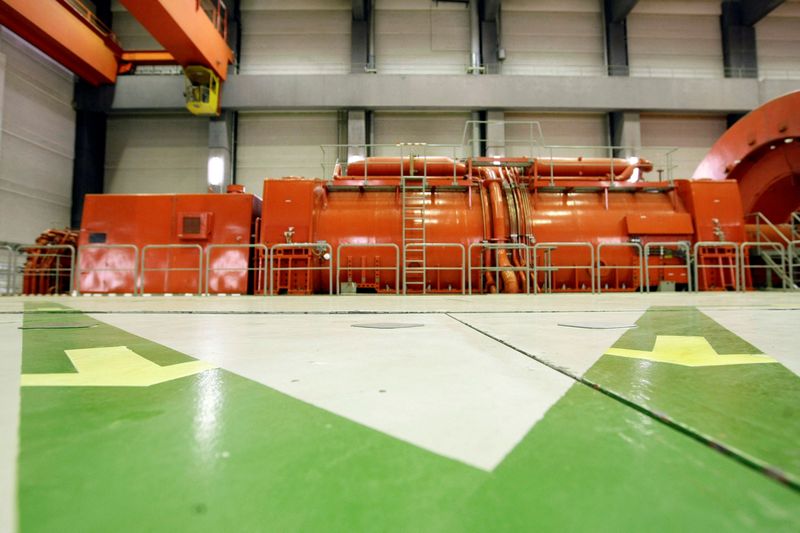By Christoph Steitz and Markus Wacket
FRANKFURT (Reuters) - German Chancellor Olaf Scholz and economy minister Robert Habeck on Sunday mapped out potentially radical changes to the country's energy system, going as far as floating the possibility to keep nuclear power plants running for longer.
WHY BOTHER?
Germany depends massively on Russian gas but Moscow's invasion of Ukraine has caused a political rethink in Berlin.
Overall, gas accounts for more than a fifth of Germany's energy mix, and Russia supplies 38% of it with Norway ranking second at 35%.
Alternatives are now under consideration, including more solar and wind power, liquefied natural gas (LNG) terminals, gas- and coal-fired power plants as well as possibly a return to nuclear power.
WHAT'S HAPPENING WITH GERMANY'S NUCLEAR PLANTS?
Nuclear-fired power plants, which still supplied 12% of Germany's gross electricity generation in 2021, remain controversial in Germany, which decided to shut them down after Japan's Fukushima disaster in 2011.
Of the 17 nuclear power plants Germany had at the time, only three remain in operation now: Isar 2, Emsland and Neckarwestheim 2, which are operated by German energy firms E.ON, RWE and EnBW, respectively.
Under current plans, the plants, with combined capacity of 4,200 gigawatts (GW), will be shut down by the end of 2022.
WOULD IT BE POSSIBLE TO KEEP THE PLANTS RUNNING?
It's politically tricky given opposition from the rank and file of the ecologist Greens party, but not impossible.
Under current legislation the remaining operators will lose the right to operate the plants beyond Dec. 31, 2022, the effective end-date for the stations.
Should Germany's network regulator, which is part of the Economy Ministry, decide that they are critical to Germany's security of supply it could allow them to run for longer, which they could technically do.
"Yes, you can extend the life-span of the nuclear-fired power plants ... if there's the will and the operators are on board," said Dirk Uwer, partner at law firm Hengeler Mueller.
Achieving this would still be complex and require parliament to change existing laws, most notably a 2017 deal under which the utilities transferred their decommissioning funds to a public trust.
"There are no longer any prohibitions on thinking," said Marc Ruttloff, partner at law firm Gleiss Lutz, who has advised E.ON on various matters related to nuclear energy policy.
Due to the hurdles, however, chances for an extension are rather low, with Germany's minister for nuclear safety - of the Greens party of which Habeck is also a member - saying on Monday such a move was irresponsible and unsafe.
WHAT ARE THE OPERATORS SAYING?
They're not euphoric.
"For years, we have been doing nothing other than preparing both technically and organisationally for the decommissioning of our plants," a spokesperson for E.ON's nuclear division PreussenElektra said.
The group neither has the nuclear fuel nor the staff that would be required to keep plants going, the spokesperson added.
RWE said its Emsland plant was scheduled to be decommissioned at the end of 2022, by which time its fuel will have been used up, adding there would be high hurdles to overcome, both technically and in terms of getting the necessary approvals, to extend the life-span.

EnBW, however, is less opposed.
"If it is necessary for the security of supply, EnBW is of course prepared to examine measures in an open-minded manner and to provide advice to the German government," it said in e-mailed comments.